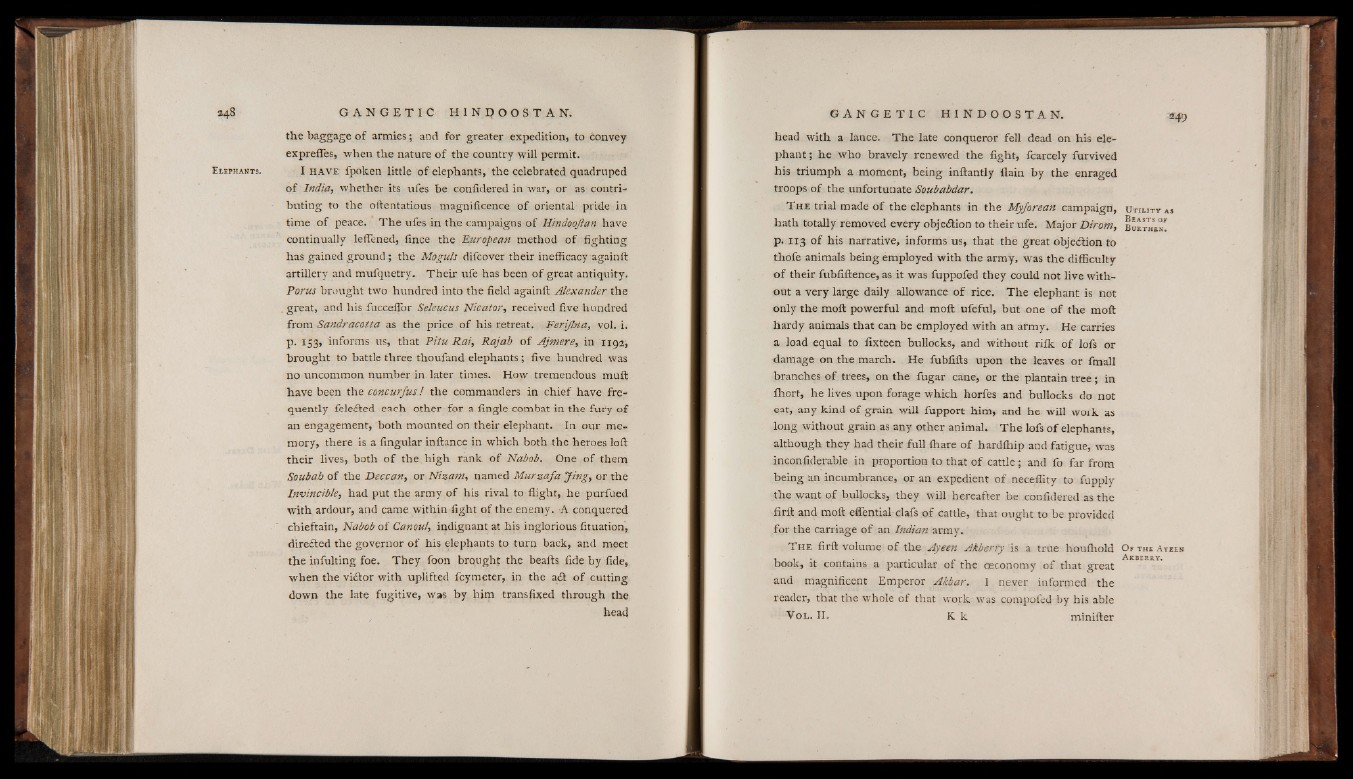
E l e p h a n t s .
the baggage o f armies; and for greater expedition, to convey
exprefles, when the nature of the country will permit.
I h a v e fpoken little o f elephants, the celebrated quadruped
o f India, whether its ufes be coniidered in war, or as contributing
to the oftentatious magnificence of oriental pride in
time of peace. The ufes in the campaigns of Hindoojian have
continually leffened, fince the European method of fighting
has gained ground; the Moguls difcover their inefficacy againft
artillery and mufquetry. Their ufe has been o f great antiquity.
Porus brought two hundred into the field againft Alexander the
. great, and his fuccefior Seleucus Nicator, received five hundred
from Sandracotta as the price of his retreat. FeriJlAa, vol. i.
p. 153, informs us, that Pitu Rai, Rajab o f Ajmere, in 1192;
brought to battle three thoufand elephants; five hundred was
no uncommon number in later times. How tremendous muft
have been the concurfusI the commanders in chief have frequently
feleited each other for a fingle combat in the fury of
an engagement, both mounted on their elephant. In our memory,
there is a Angular inftance in which both the heroes loft
their lives, both o f the high rank o f Nabob. One of them
S.oubab o f the Deccan, or Nizam, named Murzafa Jing, or the
Invincible, had put the army of his rival to flight, he purfued
with ardour, and came within fight of the enemy. A conquered
chieftain, Nabob o f Canoul, indignant at his inglorious fituation,
direfted the governor of his elephants to turn back, and meet
the infulting foe. They foon brought the beafts fide by fide,
when the vi£tor with uplifted fcymeter, in the ait o f cutting
down the late fugitive, was by him transfixed through the
head
G A N G E T I C H I N D O O S T A N . 249
head with a lance. The late conqueror fell dead on his elephant
; he who bravely renewed the fight, fcarcely furvived
his triumph a moment, being inftantly flain by the enraged
troops of the unfortunate Soubabdar.
T he trial made o f the elephants in the Myforean campaign, utility as
hath totally removed every objection to their ufe. Major Dirom, burthen!
p. 113 o f his narrative, informs us, that the great objection to
thofe animals being employed with the army, was the difficulty
o f their fubfiftence, as it was fuppofed they could not live without
a very large daily allowance o f rice. The elephant is not
only the moft powerful and moft ufeful, but one of the moil
hardy animals that can be employed with an army. He carries
a load equal to fixteen bullocks, and without rilk o f lofs or
damage on the march. He fubfifts upon the leaves or fmall
branches o f trees, on the fugar cane, or the plantain tree; in
fhort, he lives upon forage which horfes and bullocks do not
eat, any kind of grain will fupport him, and he will work as
long without grain as any other animal. The lofs o f elephants,
although they had their full fhare of hardihip and fatigue, was
inconfiderable in proportion to that of cattle ; and fo far from
being an incumbrance, or an expedient o f neceflity to fupply
the want of bullocks, they will hereafter be confidered as the
firft and moft eflential clafs of cattle, that ought to be provided
for the carriage of an Indian army.
T he firft volume of the Ayeen Akberry is a true houihold Of t h e A y e e n
book, it contains a particular o f the oeconomy o f that great Akserry-
and magnificent Emperor Akbar. I never informed the
reader, that the whole of that work was compofed by his able
V ol. II. K k minifter